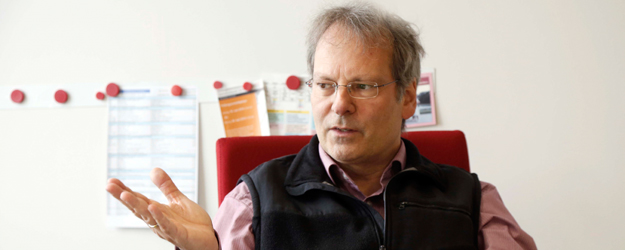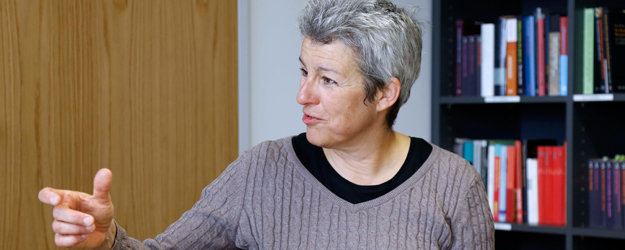17 April 2015
People are not simply different; they additionally make distinctions among themselves. At times, skin color is to play a role, then there is faith, nationality, gender. The research unit "Un/doing Differences. Practices in Human Differentiation" investigates the mechanisms that are behind what causes us to make distinctions and what it is that can make these distinctions disappear. A range of different researchers at Johannes Gutenberg University Mainz (JGU) are working hand-in-hand for this purpose – across the boundaries of their own disciplines.
Professor Stefan Hirschauer looks over at his colleague. "She is more of a sociologist than I am," says the sociologist of the anthropologist. Professor Carola Lentz counters: "And he has described the methods of anthropology in more precise terms that you will usually find in our textbooks." – "You simply cannot have anthropology without sociology – and vice versa," affirms Hirschauer. It would seem that the boundaries between the disciplines have become fluid; the very term of interdisciplinarity has become the watchword of our times. And yet, even this does not go far enough for the sociologist. "As far as I am concerned, interdisciplinarity is just a term that is used to try to paper over the cracks," he explains. "Every discipline has its own limited and somewhat distorted view of things. What we need to do is get the specialists to take off their blinkers."
The research unit "Un/doing Differences. Practices in Human Differentiation" that is supported by the German Research Foundation (DFG) looks at how people draw boundaries between each other. People classify each other by which nation they belong to or what beliefs they have. But that's not all: man or woman, black or white, high achievers or dropouts – people are also differentiated or differentiate themselves on the basis of these aspects.
Superficial phenomena but deeply rooted
"Our everyday perspective is that we assume that we humans have different characteristics which ultimately justify sorting people into various types. People are naturally different." Hirschauer pauses for a moment. "But are these differences more than skin-deep? Are they a fixed part of our identity or are they just variable superficial phenomena?"
"The social and cultural scholars in our research group believe that it is better not to speak of differences, but of differentiations." People ascribe characteristics to each other and the extent to which they do so varies. They build walls between supposedly different groups, but they also tear these walls down again.
Hirschauer refers to historical processes: "With the development of the nation state, the distinctions between factors such as gender and race were also heightened. But now the influence of nationalism has declined in Europe and it has become taboo to differentiate between races. We still haven't got quite that far yet in the case of gender." While traditional differentiations are disappearing or becoming irrelevant, new ones are emerging – between achievers and non-achievers, between those who are educated and those who are not.
The research unit at Mainz University has been investigating these phenomena in detail since 2008. Eight professors from three faculties and five disciplines are collaborating here. In addition to Lentz and Hirschauer, there are the linguist Professor Damaris Nübling, the sociologist Professor Herbert Kalthoff, theater scholar Professor Friedemann Kreuder, the anthropologist Professor Matthias Krings and the American Studies scholars Professor Oliver Scheiding and Professor Mita Banerjee. The unit has been financed by the German Research Foundation for the past two years and was originally set up for a 6-year period. An application for its continuation will be submitted this fall.
Making the invisible visible
The group’s research topic touches upon a core element of human coexistence. "Many fields of research deal with distinctions," asserts Lentz. Thus, Gender Studies is about gender, while research into nations and religion zeros in on other aspects. "But no one looks at the picture as a whole. The specialists in these various research fields have their own biased viewpoint."
And it is these biased viewpoints that the group hope to counteract. "From the very beginning, we met every two weeks in order to explain our respective approaches when it comes to research to each other. It was as a result of our coming together over many years that we finally decided to submit an application to the German Research Foundation."
There are eight sub-projects that consider very different facets of "Un/doing Differences." Ethnic and national differentiation in African national celebrations are the specialty of Professor Carola Lentz. "If you are trying to build a nation state, you have a massive problem: How do you actually make something visible that is invisible, such as a nation? For this purpose, you can use things such as a national holiday, a national flag, a national anthem."
One feature of a national celebration is a parade. "Totally different groups are involved here and they are often separated by age, gender, or profession." Lentz gives the example of Ghana. "Everyone has a well-defined place in the parade itself and among the audience. There is a prescribed seating plan; members of parliament sit here, ministers of religion sit there while members of the military sit somewhere else. People present themselves as members of a professional group, an ethnic group, or even of a school class." Distinctions become clearly visible and significant. At the same time, however, they are all subsumed under the national slogan "Unity in Diversity." They all serve the national concept.
A construction kit for research
"What we have here is an example of the subordination of everything to the superordinated concept of the nation state," adds Hirschauer. "But how does this kind of thing work in everyday life, how is this brokered? What happens to minorities?"
It is "doing" rather than "undoing" differences that seems to be ubiquitous. Under National Socialism, the concept of race became all-prevailing – with disastrous consequences. After the attacks of September 11, 2001, the Arab and the Christian worlds were increasingly seen as separate blocks. But differences are also constantly being undone. "Take the recent elections in Israel. Look at the United Arab List in which Islamists, feminists, and leftists have all suddenly come together," points out Hirschauer.
"We want to understand how distinctions between people arise and how they change. When will an aspect be downplayed, when will another be emphasized? What groups suffer as a result? Why on earth do we have this obsession with making distinctions? When is it necessary to us? In our research unit we have already learned a lot about the general rules of the game. Currently, we are in the process of developing a common analytical language, an empirically imbued terminology."
"We are compiling a conceptual tool kit we can use to answer these questions," says Lentz, taking up the thread. "But this will only be possible if we really work together closely. It is not sufficient to simply form a group, to choose a speaker, and leave it at that. You can only really get to the nub of the matter if you are prepared to take interdisciplinary collaboration seriously."
It was with this in view that the research unit was formed six years ago. Meanwhile, the project "Un/doing Differences" is in the thick of it. "After all, we have managed to get together despite the many significant differences," declares the anthropologist. The sociologist nods in agreement.



